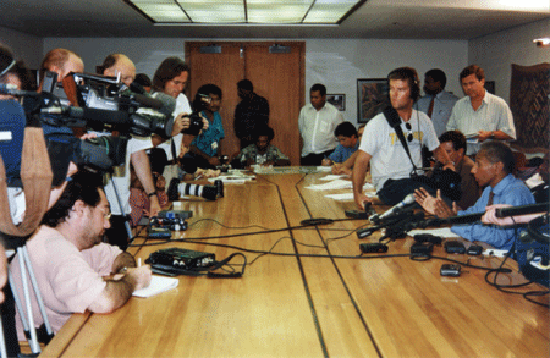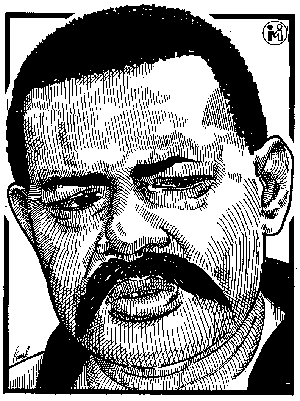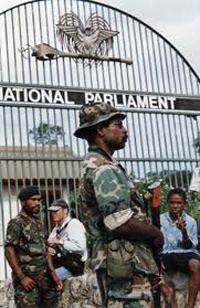
The former commander of the Papua New Guinea Defence Force, Jerry Singirok, reflects on the 1997 Sandline mercenary crisis that grabbed international headlines. His professional judgement at the time on the future of his country was critical. His conscience outweighed what was deemed a lawful executive order.
OPINION: It has been 14 years to this day when, as Commander Papua New Guinea Defence Force, I made a conscious decision, not only to abort the Sandline Contract “Contravene”, but also to expel Sandline mercenaries out of PNG and subsequently ask the then Prime Minister, Sir Julius Chan, his deputy and the Minister for Defence to resign.
Historians and many commentators have marked this event as a major crisis in PNG history. However, in the main it was a result of series of blunders on the part of the executive arm of the government and policy advisor who had far ulterior motives other than addressing genuine plea for increased benefits for the landowners and the Bougainville Provincial Government.
However, in the main it was a result of series of blunders on the part of the executive arm of the government and policy advisor who had far ulterior motives other than addressing genuine plea for increased benefits for the landowners and the Bougainville Provincial Government.
Jerry Singirok
Forner commander Jerry Singirok: PNG has failed to learn its lessons. Graphic: Gemini News
The result was a significant shift in the security decision making thus affecting national security within the context of protecting PNG’s national interest, subsequently unleashing the contract by the grieving party which was me as commander and a handful of military hardliners who supported my opposition and successfully executed Operations “ Rausim Kwik”.
Upon reflection, it is disheartening to say the least that nothing has changed much since March 1997.
From the influx of illegal immigrants, lack of effective border security, and hegemonic tussles between the economic global giants, PNG continues to be an open and free playing field for investors and opportunists who by cohesion with our decision makers and respective agencies in the name of economic development ignore the plight of landowners and continue to generate uncertainties, frustrations thus creating a certain air of frustration throughout Papua New Guinea today.
Our era (1975-1997) was in the cold war era, where the military had to re-think and re-strategise new roles in Civil Military Affairs whereby the military if it had to justify its existence, must be restructured and re-trained into a military force that should be ready to assist during natural disaster, assist mainly in policing roles and contribution to international peace keeping and law enforcement.
Peace-making
It was therefore incumbent that those in position of command at that time understand the transition of a fighting force to a force for peace-making and the constraints and limitations it had was most daunting task for any military commander.
This was the dilemma I had as commander where the Papua New Guinea Defence Force was not tailored to fight a prolonged civil war against antagonists as it was not prepared, ill-equipped, lacked combat power which drastically affected the morale of the troops and most significantly lacked the political support.
I had been a career soldier and attended one of the most prestigious and reputable military colleges where future generals were bred. I have been privileged to be an exchange officer with the United States Army, British Army and was accorded a two-year employment opportunity with the Australian Defence Force as a lecturer in military arts and tactics at the Land Warfare Centre. These exposures and professional training I received were an insurance that assisted me to take command of the Defence Force even at a prime age within the bounds of good command, leadership and stewardship based on strict military ethos based on empathy.
These exposures and professional training I received were an insurance that assisted me to take command of the Defence Force even at a prime age within the bounds of good command, leadership and stewardship based on strict military ethos based on empathy.
I will always mitigate and justify my actions regardless of public opinion and what lawyers and critics say. My professional judgement at the material time was critical where my conscience far outweighed what was deemed as a lawful executive order. To me, were superior orders seemed unlawful because of the serious consequences of a planned military operation against thousands of innocent civilians.
The consequence of the actual military onslaught according to my professional judgment would result in a carnage that would have been devastating to include serious crimes against humanity and would have drawn global condemnation and possible indictment to the Hague to face the War Crimes Tribunal for atrocities against thousands of innocent civilians.
The indictment would have included members of the National Security Council and me as commander, as we would be deemed to be culpable for conducting surgical military operations.
Investors flocking
The experiences by Bougainvillians, Panguna landowners, royalty issues, the environmental damages and the lack of negotiation on their behalf by the National Government and the developer, Bougainville Copper Limited were critical issues that were not mitigated well.
The lessons of good governance which lacked wider community and professional consultation are still ambiguous even to this day. Investors with multibillion investments are flocking into PNG to exploit the people and the resources that are now becoming scarce globally regardless of community concerns.
Today foreign and commercial security companies have taken over national security functions it seems, a service reserved for state security forces with little or no government investment has been redirected to revitalise and revamp PNG’s own security forces. As a result of this neglect, the national security agencies have become defunct, disjointed, and operationally ineffective to protect PNG’s interest, sovereignty and security to say the least.
The concerns of lack of comprehension and understanding the issues of protecting national interest and security are appalling. It requires a government that puts the wellbeing of its citizens first before any other agendas.
Papua New Guinea’s law and order problem is escalating, HIV and AIDS is on an endemic rise, use of illegal guns, poverty is widespread, rural infrastructure is deteriorating or has been deteriorating and the government services of basic health and education have not been provided to many remote parts of PNG.
The land border with Indonesian-ruled Papua remains porous and the maritime boundaries and air space are not protected.
Equally of significant concern is the environmental damage as a result of industrial waste by the multimillion investors are a force of destruction that has and will continue to affect and plague Papua New Guinea.
Open door policy
Really, if we continue the trend in the next five years of neglect to our national security then we may as well have an open door policy where exploiters globally can help themselves to our God-given resources forcing the next generation to opt to resort to antagonism as seen globally where established regimes are being literally ousted by the mass.
It is too evident to see the parallels of what is happening in PNG today even after a series of governments came into power from 1997 onwards – except today there is tactfulness in the way large contracts are handled so as to suppress and distort public opinion.
The landowners and the citizens always get the raw end of the deal.
Regrettably the lessons learnt from the engagement of Sandline mercenaries and Bougainville civil war is easily forgotten it seems.
While Papua New Guinea continues to go down a path of self-destruction based on omissions, self serving and false proclamation of the wealth creation for only a few, the reality is that the next generation of Papua New Guineans may turn out to be a generation of disgruntled, misfits, uneducated, city roamers who may see those in authority as tyrants, self serving and may decide to take up arms to engage in a prolonged armed resurrection against the government, foreign investors and exploiters.
In any case, this security quagmire offers scenarios anticipated in the coming decade that would be very difficult to deal with as lessons in the past have never been learnt.
It has always and will be the people’s call first for good governance while upholding our Constitution for the wellbeing of our citizens. It’s time to learn from the lessons learnt from Sandline in 1997 and correct them for the better.
Major-General Jerry Singirok, MBE (Rtd), was Commander of the PNG Defence Force at the time of the Sandline crisis in 1997. This article is republished from the PNG Post-Courier.



